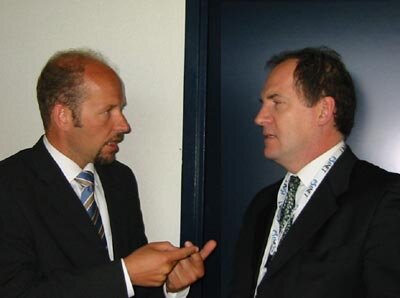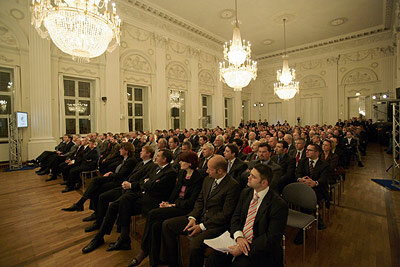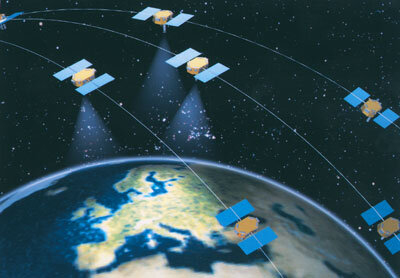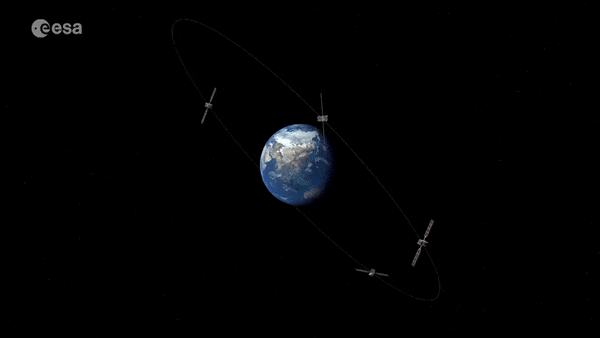Galileo Masters 2005: one way to develop business from space systems
The Galileo Masters competition aims to encourage small enterprises across participating European regions into thinking up new satellite navigation applications. It was started in 2004 by the State of Bavaria's Ministry for Economic Affairs, Transportation, Infrastructure, Technology, Anwendungszentrum GmbH of Oberphaffenhofen, and SYSTEMS, the leading business-to-business trade fair for IT, media and communications in Munich.
Galileo Masters 2005 was the second competition to be held with seven countries/regions participating: Gothenburg (Sweden), Busto Arsizio/Varese (Italy), Sophia Antipolis (France), Noordwijk (The Netherlands), London (England), Prague (Czech Republic) and Munich (Germany).

ESA's European Space Incubator (ESI) took part in the regional competition in South Holland, the Netherlands. Bruno Naulais, ESI Manager and jury member, was impressed by the number of intelligent ideas on how the new Galileo signals could be used by novel systems. For the Dutch region, he emphasized that although the jury decided on a single winner: "This certainly does not close the door for a number of participants who can expect an invitation to submit their business proposal to ESI through the normal ESI selection procedure."
Optimise urban transport, reduce pollution
Why drive a one-tonne 100-horsepower petrol-powered saloon car carrying a single 70 kg person for a 20-minute urban trip, when a light, silent and environmentally clean electric vehicle of 2 kW can do the same job? A new idea using Europe's Galileo navigation system could provide an answer to city pollution and traffic jams.

Impressive solutions to boost environmental protection and help avoid traffic collisions, both on water and in the air, were some of the entries in this year's Europe-wide 'Galileo Masters 2005' competition to look for the most creative satellite-based navigation ideas. Over 220 participants in this year's round submitted 88 proposals and seven regional winners were selected to participate in the finals.
Georges Gallais from Nice Sophia-Antipolis in France took first place with his system to use satellite navigation to improve urban transportation by having a common pool of shared small electric-powered cars. With his idea named 'VU Log', Gallais intends to revolutionize the car-sharing initiatives that have been around since the 1990s, to reduce emissions and energy consumption in cities. VU Log will use Galileo to help locate the nearest available electric-powered car. Drivers can access the car using a smart card, drive to their destination, pay only for the distance travelled and on arrival leave the car for the next user. Drivers have no worries about maintenance or refuelling as this is handled at night by those responsible for running the pool of small electric cars.
Help people
In Prague, Vladimir Jansa proposed an emergency system called a 'Personal Watcher' to monitor people at risk, such as children and the elderly. Sensors monitor important body functions, Galileo signals pinpoint the person's exact location and all data are transmitted to a central surveillance centre at regular interval. Emergency alerts can be sent by a 'panic button' and by an inertial system to monitor, for example if an elderly person falls. A call button can activate a two-way voice communication with an alarm centre.

Daniel Isaksson from Sweden proposed using Galileo to track down stolen bicycles. Inside the bicycle frame is a small box which transmits where the bicycle is located. The box includes a positioning chip, a GSM-based transmitter, an antenna and a small battery. A central computer receives continuous data on the bike's position and then converts this into a position on a map, which the bicycle owner can see on request, maybe by using a mobile phone. All the technology is available; however the requirement of very low energy consumption could require improvements to some components. The system would help retrieve easily stolen bicycles, decrease significantly administrative police work and reduce insurance costs.
Avoid collision
Frank Hermanns of Germering, Germany impressed the jury of experts with a satellite-based system to optimise traffic management and avoid collisions in aviation and maritime travel. The craft's precise location, together with information on its velocity, direction and route, are sent together with weather and wind data to a central simulation centre. Additional surveillance radar data are then used to include information on vehicles which do not transmit their location. An expert computer system can then predict possible collisions and issue warning messages to craft at risk.
Encourage the development of new Galileo-based systems
An idea to develop an inexpensive Galileo navigation Do-It-Yourself (DIY) kit came from the Netherlands. This would particularly help inventors, start-up companies and small and medium size companies (SMEs). With the DIY kit, companies can create their own Galileo functionality and integrate them in their products. Rafael Lucas, head of the Navigation Applications Office in ESA, said the idea fits well with ESA's objectives to promote new applications: "We prefer to focus on generic technologies for application developers to use and experiment with".
Galileo perspectives

GIOVE-A, the first Galileo in-orbit validation element, was successfully launched on 28 December. The full constellation of 30 spacecraft will be in orbit by 2010. The European Galileo system will be compatible and interoperable with the US global positioning system (GPS) and the Russian GLONASS system. Galileo is an initiative of the European Commission and ESA for a civil-run network and for the first time a global positioning system will offer performance guarantees. Galileo's increased reliability will be particularly useful in situations where safety is paramount, for example when guiding planes, ships or road traffic.
For companies with innovative ideas on how to use the improved navigation data from the Galileo satellites there will be new markets to exploit leading to benefits in daily life. Galileo will provide considerable economic and social benefits for all and particularly for Europeans.
More information on the competition, the seven regional winners and their systems can be found in the 'Galileo Masters 2005 - The Result' brochure.





